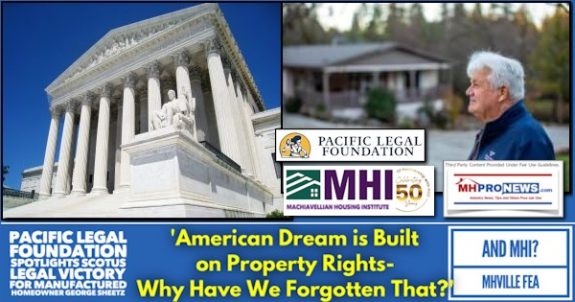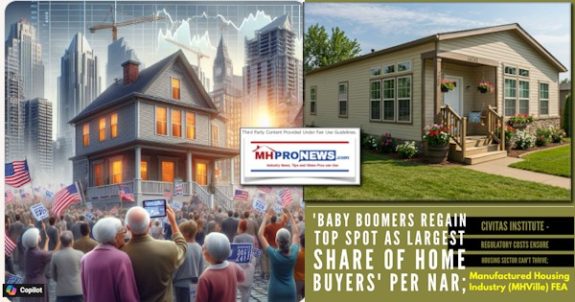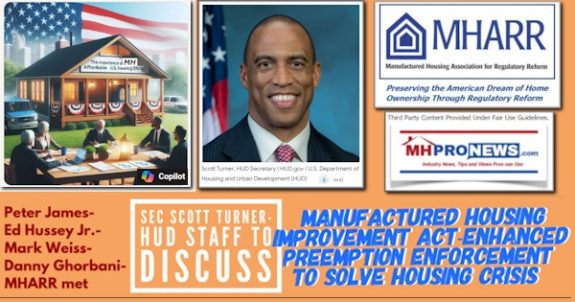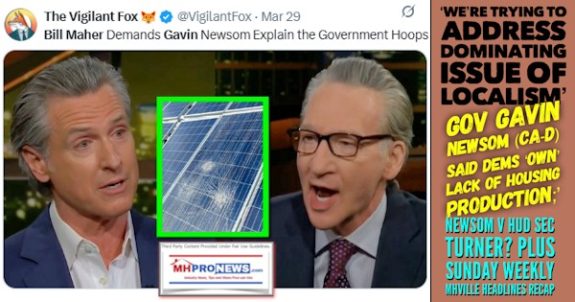
2012 National Congress & Expo a Huge Success – Attendees Show Strong Determination and Optimism for a Great Future
We would like to thank the 700 registrants, speakers, sponsors, and exhibitors that helped make the 2012 Congress & Expo for Manufactured and Modular Housing a huge success. Attendees from all sectors of the industry convened in Las Vegas April 10th-12th to take advantage of the educational sessions, the National Communities Council (NCC) Forum, networking opportunities, and to see the latest and greatest products and services offered by the exhibitors and more.
Speakers and educational sessions tackled a host of challenges and opportunities for our industries. Topics included innovative approaches for increasing sales/profits in today’s housing market to navigating today’s challenging land-lease community market, and complying with new state and federal consumer protection laws as they relate to retailing and community operations. All of these sessions were very informative and provided a wealth of information on all aspects of manufactured and modular housing.
During the National Communities Council (NCC) Forum, sponsored by ROC USA, attendees heard from some of the industry’s leading experts on topics such community lease-option programs, legal issues for communities, social media, economic trends, cutting edge design trends for housing, and more.
Keynote speakers at the meeting’s general sessions included Dr. David Crowe, chief economist for the National Association of Home Builders, and John K. McIlwain, senior resident fellow/J. Ronald Terwilliger Chair of Housing at the Urban Land Institute. These housing leaders not only spoke on how their respective organizations are looking at manufactured and modular housing; they also came to learn and better understand how our industries will be playing a stronger role in tomorrow’s housing marketplace. The featured speaker for Thursday’s General Session was Karen Purves, whose presentation focused on building positive relationships with homebuyers.
Always a highlight of the event was the 2012 National Awards Luncheon sponsored by Triad Financial Services. Awards were presented to communities, retailers, and companies who provide outstanding customer service and leadership for the industry. Click here to view the awards presentation. Click here to view the press release highlighting the award-winning industry members.
Special thanks go to all the suppliers, manufacturers, exhibitors and special sponsors who made the 2012 National Congress & Expo such a success. Their belief in and commitment to the manufactured and modular housing industries are the cornerstones of our industries’ survivability and the foundation for its future successes.
MHI thanks everyone involved for making this a great event. Please mark your calendars for the 2013 Congress & Expo which will be held April 16-18, 2013 at the Paris Hotel in Las Vegas.
Support Grows for Preserving Access to Manufactured Housing Act
The list of U.S. Representatives formally co-sponsoring the Preserving Access to Manufactured Housing Act (HR 3849) continues to grow. So far, nearly 30 Representatives have endorsed the bipartisan measure, with more expected to co-sponsor over the coming weeks.
Those co-sponsoring the bill introduced by Rep. Stephen Fincher (R-TN), include Reps. Black (R-TN), Blackburn (R-TN), Boren (D-OK), Boswell (D-IA), Calvert (R-CA), Chandler (D-KY), Cole (R-OK), Dent (R-PA), Dold (R-IL), Donnelly (D-IN), Duncan (R-TN), Fitzpatrick (R-PA), Harper (R-MS), Jones (R-NC), Lankford (R-OK), Loebsack (D-IA), Lucas (R-OK), Manzullo (R-IL), Miller (R-CA), Nunnelee (R-MS), Palazzo (R-MS), Rahall (D-WV), Renacci (R-OH), Roe (R-TN), Rogers (R-AL), Schweikert (R-AZ), Sullivan (R-OK) and Thompson (D-MS).
Manufactured housing industry stakeholders are encouraged to contact their U.S. Representatives and ask that they cosponsor HR 3849. For a copy of MHI’s action alert, which contains talking points and a sample letter, click here.
MHI Members Meet with Office of Management and Budget Personnel to Discuss New Energy Efficiency Standards for Manufactured Housing
Recently, MHI member Mark Ezzo of Clayton Homes Inc., Emanuel Levy of the Systems Building Research Alliance and MHI staff met with key personnel from the Office of Management and Budget (OMB) and the Department of Energy (DOE) to discuss MHI’s concerns with the new proposed energy efficiency standards for manufactured homes. Specifically, staff provided a national industry overview of the current manufactured housing marketplace and the challenges we face as an industry.
In 2007, as part of The Energy Independence and Security Act (EISA; P.L. 110-140), Congress directed the U.S. Department of Energy (DOE) to establish, implement and enforce new energy efficiency standards (Sec. 413) for manufactured housing. The standards would be in addition to, and are expected to replace, the energy efficiency standards in the current HUD Code. The legislation moves HUD’s statutory responsibility for manufactured home energy standards to DOE.
The U.S. Department of Energy (DOE) has drafted the proposed regulations and currently the rule is under review by the Office of Management and Budget (OMB). The agency will evaluate the effectiveness of programs, policies, and procedures, and will assess competing funding demands among agencies, and set funding priorities.
MHI believes that the new standards need to strike a balance: minimize energy use and costs for the next generation of manufactured homes while preserving affordability. Click here to view MHI’s initial concerns with DOE’s proposed new energy efficiency standards. Given the economic climate, the effect of the new energy efficiency standards should be evaluated for overall additional costs to already burdened consumers and to small businesses who are struggling to survive the highly uncertain economic environment.
MHI staff continues to work with Congressional staff to modifying language in Section 413 of the Energy Independence and Security Act to eliminate duplicative enforcement of Manufactured Housing Standards and maintain HUD as the industry’s primary regulatory body.
CFPB Regulatory Review
CFPB Unveils Outline of Mortgage Servicing Rules
On April 9th, the Consumer Financial Protection Bureau (CFPB) unveiled an outline of a mortgage servicing rules proposal that it plans to issue this summer and adopt by January 21, 2013, with an implementation date still under consideration (under Dodd-Frank implementation of final rules must occur by January 2014). These rules would apply to those servicing manufactured home loans secured by personal property. Aspects of the rules under consideration include:
• Requiring monthly mortgage statements that include detailed payment information and, for delinquent borrowers, alerts and information about counselors who can assist in working with servicers and avoiding foreclosure.
• Requiring disclosures before the interest rate changes on an adjustable rate mortgage, including when the change will take effect and alternatives the consumer may pursue if the new mortgage payment will not be affordable.
• Additional rights for consumers in connection with the force-placement of hazard insurance by servicers, including a requirement that services provide advance notice and pricing information before charging borrowers for the insurance.
• Requiring servicers to make good faith efforts to contact delinquent borrowers and inform them of foreclosure alternatives.
• Requiring various policies and procedures for the handing of borrower accounts, including prompt editing of payments, maintaining accurate account information, prompt resolution of borrower claims of errors, and direct, easy and on-going access for delinquent borrowers to the servicer’s foreclosure prevention team.
Click here for more information, including a fact sheet on the mortgage servicing rules being considered.
CFPB to Examine Service Providers to Supervised Institutions
On April 13th, the CFPB indicated it will expand its examination scope beyond supervised institutions themselves and examine their service providers. In an agency bulletin signaling this expansion of authority, the CFPB stated that it “expects supervised banks and non-banks to oversee their business relationships with service providers in a manner that ensures compliance with federal consumer financial laws,” and “the mere fact that a supervised bank or nonbank enters into a business relationship with a service provider does not absolve the supervised bank or nonbank of responsibility for complying with federal consumer financial law.”
CFPB also indicated that it maintains full supervisory and enforcement authority over service providers under Title X of the Dodd-Frank Act and that it “will exercise the full extent of its supervision authority over supervised service providers, including its authority to examine for compliance with Title X’s prohibition on unfair, deceptive, or abusive acts or practices.”
Click here for a copy of the CFPB bulletin.
House Republicans Launch Dodd-Frank Burden Tracker
On April 19th, the House Financial Services Committee unveiled the Dodd-Frank Burden Tracker, an online resource to help track new rules and regulations required by the Dodd-Frank Act.
A committee press release indicates that Dodd-Frank “mandates that government regulators write over 400 new rules and requirements that will be imposed on the private sector. Since the law was signed by President Obama in July 2010, the Dodd-Frank Burden Tracker reveals: regulators have written 185 of the 400 rules; these 185 rules consume 5,320 pages; and, it will take private sector job-creators 24,035,801 hours every year to comply with these first 185 Dodd-Frank rules.”
Click here for more information.

























